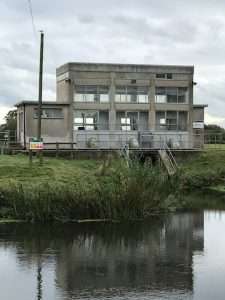It has been a day when, even at midday, it never seemed fully light. A thick, heavy blanket if greyness seemed to express the mood of the first ordinary day after the Christmas-New Year holidays.
By half past four, there was a deep gloom, there seemed no lingering light in the sky to the west. Driving out of Langport, there seemed to be something dark coming towards the town, its presence noticeable because it was silhouetted by the headlights of cars that drove slowly along behind it. The dark object was being driven by someone in a bright yellow high visibility jacket, someone who seemed content at the sedate speed at which they were travelling.
Drawing closer, the darkness was revealed to be a red Ferguson tractor of a vintage when lights were an optional extra. Were there still a police station in the town, one of the constables might have stopped the driver and remonstrated with him about there being no lights. In the present times, policemen are such a rare phenomenon that being apprehended for anything is unlikely.
Away from the town, there was still enough lightness in the clouds for it to have been possible to see ahead. Being seen by the driver of another vehicle would have been another matter, anyone moving at speed might have been unable to slow in time to avoid collision with the tractor.
Perhaps the driver of the red Ferguson is too young to remember times when officers of Bath and Somerset Constabulary kept a vigilant eye on all that took place in the district.
One bright summer’s day, perhaps it was at harvest time, one of the local policemen arrived at the farmyard about a grey Ferguson tractor that did much of the donkey work around the farm. It was parked at the back of the farm cottage and lacked things that PC Pearce or Sparkes, it is hard to remember which, considered essential. There were no lights and no number plates; if tax discs were a requirement, then the tractor probably lacked one of those, as well. The policeman’s visit had an immediate impact, a can of white paint was used to paint the tractor’s registration number on the offside rear mudguard.
Policing in the 1960s seemed different from what it is now. There were no fines issued, no prosecution arising from the shortcomings of the tractor: a visit and a warning were sufficient.
Had the driver of the red Ferguson encountered a policeman, it is hard to imagine that the treatment would have been as lenient.


